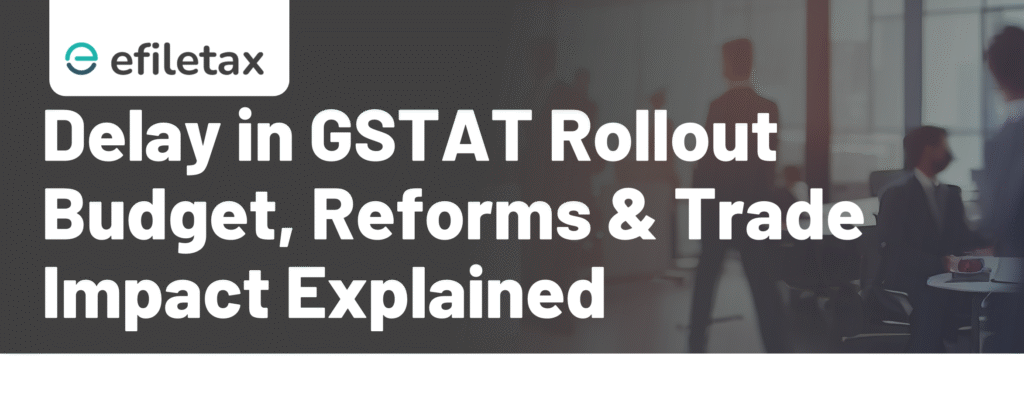
GSTAT Delay: Budget, Laws, and Trade at Stake
The delay in operationalizing GSTAT—the Goods and Services Tax Appellate Tribunal—is becoming a critical issue in India’s tax ecosystem. Despite legal backing under Sections 109–114 of the CGST Act, and constitutional support under Article 323B, GSTAT is yet to become fully functional even after eight years of GST rollout.
What Is GSTAT and Why Does It Matter?
- Reduce judicial backlog in High Courts
- Offer specialised GST dispute resolution
- Ensure faster justice for businesses
Currently, litigants depend on High Courts or state-level benches (where existing) for second appeals. This clogs the system and delays refunds or resolution of tax demands.
What the Government Said in Lok Sabha
On 24 July 2025, Minister of State for Finance Shri Pankaj Chaudhary gave a written reply in the Lok Sabha on the delay. Key points:
| Issue | Clarification by MoS Finance |
|---|---|
| Legal Framework | Amendments made via Finance Act, 2023 for GSTAT implementation |
| Procedure Rules | Notified as GSTAT (Appointment and Conditions of Service of President and Members) Rules, 2024 |
| Bench Locations | Centre working with states; zones and benches to be notified |
| Budgetary Allocation | ₹350 crore allocated in Budget 2024–25 for GSTAT infrastructure |
| Delay Reason | Coordination with states and judicial process for appointments |
[Source: Lok Sabha Unstarred Question No. 2518, 24 July 2025]
Key Legal & Policy Developments Around GSTAT
1. Finance Act, 2023 – Major Push
- Empowered GST Council to recommend rules for appointment of members
- Removed earlier ambiguity under CGST Sections 109–110
- Brought GSTAT under Article 323B framework with clarity
2. GSTAT Procedure Rules, 2024
These rules define:
- Number of Benches and zones
- Minimum qualification for members (judicial and technical)
- Appointment method by a Search-Cum-Selection Committee
3. GSTAT vs High Court Litigation
| Feature | GSTAT | High Court |
|---|---|---|
| Jurisdiction | GST second appeals | Constitutional matters |
| Timeline | Expected 1–2 years | Can take 3–6 years |
| Cost | Lower | Higher legal fees |
| Consistency | More GST-focused rulings | Mixed jurisprudence |
Why Is the Delay a Problem?
- Refunds held up: Businesses can’t recover wrongly paid tax until tribunal resolves appeal
- Working capital stuck: MSMEs face cash crunch
- Uncertainty in law: Different High Court rulings on same GST issues
- Loss of faith in system: Justice delayed is justice denied
Expert Tip: File Protective Appeals
Until GSTAT is fully functional, taxpayers should continue filing protective appeals before High Courts to avoid being time-barred. Once GSTAT benches are notified, cases can be transferred.
FAQs on GSTAT Delay
Q1. Can GSTAT be set up without state approval?
No. GST is a dual levy. Bench locations require GST Council recommendation and Centre-state coordination.
Q2. Where will the benches be located?
As per GST Council’s 53rd meeting, Principal Benches may be in Delhi with regional benches across zones like Chennai, Mumbai, Kolkata, Ahmedabad, etc.
Q3. Is the ₹350 crore allocation enough?
The initial amount covers infrastructure, manpower, and IT systems, but additional funds may be required post-implementation.
Final Thoughts
The delay in operationalizing GSTAT affects not just legal timelines but India’s ease of doing business. With Finance Act amendments in place and budgetary support committed, the ball is now in the Centre–state coordination court. Businesses should stay prepared, maintain documentation, and seek professional help to safeguard their appeal rights.
Need help with GST litigation or refunds? File with Efiletax now — India’s trusted platform for GST and tax compliance.
Summary
The delay in setting up GSTAT has stalled thousands of GST appeals. With Finance Act changes, notified rules, and ₹350 crore budget, the tribunal’s operationalization is in sight—but pending state coordination. Learn how this impacts businesses and what you can do in the meantime.